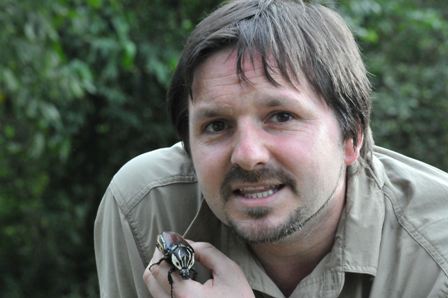Dr Stewart Plaistow from the University’s Institute of Integrative Biology, is photographed here holding an African Goliath beetle – one of the biggest beetles in the world – as part of his work with undergraduate students on tropical ecology in Uganda.
Dr Plaistow takes a group of second year undergraduate students to Kibale and Queen Elizabeth National Parks every year to learn about tropical ecosystem function, primate ecology and forest dynamics, as well as human-wildlife conflict issues. Students on the course learn how to use numerous field techniques to investigate the long-term effect of tree felling on the diversity of avifauna, the microclimate, and vegetation dynamics.
The students design and carry out their own six-day research projects, with topics including ant foraging, dung beetle ecology, primate vigilance, and pollination biology. The final aspect of the course focuses on eco-tourism and its implications for conservation biology.
Dr Plaistow said: “Queen Elizabeth National Park is a fascinating place to work and for the students to experience. It boasts more than 600 species of bird and over 100 species of mammal including hippos, warthogs, elephants and lions. Such high biodiversity explains why Queen Elizabeth is the most visited National Park in Uganda and an ideal place to study ecotourism in action.
“Kibale National Park has one of the highest diversities of primates in the world, with species including chimpanzees and the largest, and perhaps only viable, population of the endangered Uganda red colobus monkey. But this diversity is nothing compared to what we see with insects in Uganda. The African Goliath beetle, pictured in this photograph, is in some ways exceptional in that we know what it is, but there is a real possibility that some of the insects we find in our field work have yet to be described.”
“Living in and around the National Park has pros and cons for local people. We hear elephants raiding local crops every year we are there. But it is these personal experiences that underpin the popularity and success of the course. Reading about something in a book or hearing about it in a lecture is of course very different to experiencing it in front of you, so we try to adopt a hands-on approach to the course as much as possible.”
For more information on the Tropical Ecology module, please visit the website.
